- Home
- Albert Camus
The Sea Close By
The Sea Close By Read online
Albert Camus
THE SEA CLOSE BY
Contents
The Sea Close By
Summer in Algiers
PENGUIN MODERN CLASSICS
THE SEA CLOSE BY
Albert Camus was born in Algeria in 1913. He studied philosophy at the University of Algiers, then became a journalist, as well as organizing the Theatre de l’équipe, a young avant-garde dramatic group. His early essays were collected in L’Envers et l’endroit (The Wrong Side and the Right Side) and Noces (Nuptials). As a young man, he went to Paris, where he worked on the newspaper Paris Soir before returning to Algiers. His play, Caligula, appeared in 1939, while his first two important books, L’Etranger (The Outsider) and the philosophical essays collected in Le Mythe de Sisyphe (The Myth of Sisyphus), were published when he returned to Paris. After the occupation of France by the Germans in 1940, Camus became one of the intellectual leaders of the Resistance movement. He edited and contributed to the underground newspaper Combat, which he had helped to found. After the war, he devoted himself to writing and established an international reputation with such books as La Peste (The Plague) (1947), Les Justes (The Just) (1949) and La Chute (The Fall) (1956). During the late 1950s, Camus renewed his active interest in the theatre, writing and directing stage adaptations of William Faulkner’s Requiem for a Nun and Dostoyevsky’s The Possessed. He was awarded the Nobel Prize for Literature in 1957. Camus was killed in a road accident in 1960. His last novel, Le Premier Homme (The First Man), unfinished at the time of his death, appeared for the first time in 1994. An instant bestseller, the book received widespread critical acclaim, and has been translated and published in over thirty countries. Much of Camus’ work is available in Penguin.
The Sea Close By
Logbook
I grew up in the sea and poverty was sumptuous, then I lost the sea and found all luxuries grey and poverty unbearable. Since then, I have been waiting. I wait for the homebound ships, the house of the waters, the limpidity of day. I wait patiently, am polite with all my strength. Men see me walk by in fine and learned streets, I admire landscapes, applaud like everyone else, shake hands, but it is not me speaking. Men praise me, I dream a little, they insult me, I scarcely show surprise. Then I forget, and smile at the man who insulted me, or am too courteous in greeting the person I love. What can I do if all I can remember is one image? Finally they call upon me to tell them who I am. ‘Nothing yet, nothing yet …’
It is at funerals that I excel myself. I do, indeed. I walk slowly through the iron-strewn paths of suburbs, travelling along wide lanes planted with cement trees and leading to holes in the cold earth. There, beneath the scarcely reddening bandage of the sky, I watch bold workmen inter my friends beneath six feet of earth. If I then cast the flower which a clay-covered hand holds out to me, it never misses the grave. My piety is exact, my feelings as they should be, my head is suitably inclined. I am admired for finding just the right word. But I have no merit in this: I am waiting.
I have been waiting for a long time. Sometimes, I stumble, I lose my touch, success evades me. What does it matter, for I am then alone. It is thus that I wake up at night, and, still half-asleep, think I hear the sound of waves and the breathing of the waters. Fully awake, I recognize the wind in the trees and the sad murmur of the empty town. I then need all my art to hide my distress or clothe it in the prevailing fashion.
At other times, on the contrary, I am helped. On certain days in New York, lost at the bottom of those wells of stones and steel where wander millions of men, I would run from one to another. without seeing where they ended, exhausted, until I was sustained only by the human mass seeking its way out. But, each time, the distant siren of a tug-boat came to remind me that this town, this empty well, was an island, and at the tip of the Battery the water of my baptism was awaiting me, black and rotting, covered over with hollow corks.
Thus, though I possess nothing, have given away my fortune, camp by the side of all my houses, I can still be blessed with all riches when I choose, set sail at every hour, unknown to despair. There is no country for those who despair, but I know that the sea comes before and after me, and hold my madness ready. Those who love and are separated can live in grief, but this is not despair: they know that love exists. This is why I suffer, dry-eyed, in exile. I am still waiting. A day comes, at last …
The bare feet of the sailors beat softly on the deck. It is dawn, and we are setting sail. The moment we leave harbour, a short, gusty wind vigorously brushes the sea which curls backwards in small, foamless waves. A little later the wind freshens and scatters the sea with swiftly vanished camellias. Thus throughout the morning we hear our sails slapping over a cheerful pond. The waters are heavy, scaly, covered with cool foam. From time to time the waves yap against the bow; a bitter, unctuous foam, the God’s saliva, flows along the wood and loses itself in the water where it scatters into shapes that die and are reborn, the hide of a white and blue cow, an exhausted beast which drifts a long way behind our wake.
Since our departure the seagulls have been following our ship, apparently without effort, almost without moving their wings. Their fine straight navigation scarcely leans upon the breeze. Suddenly, a loud plop at the level of the kitchens casts a greedy alarm among the birds, throws their fine flight into confusion and sends up a fire of white wings. The seagulls whirl madly in every direction, and then without any loss of speed drop away from the fight one by one and dive down to the sea. A few seconds later they are together again on the water, a quarrelsome farmyard that we leave behind us, nestling in the hollow of the wave, and slowly plucking through the manna of scraps.
At noon, under a deafening sun the sea, exhausted, scarcely finds the strength to rise. When it falls back on itself, it makes the silence whistle. It cooks for an hour and the pale water, a vast white-hot iron sheet sizzles. In a minute it will turn and offer its damp side, now hidden in waves and darkness, to the sun.
We pass by the gates of Hercules, the headland where Antaeus died. Beyond, the Ocean lies everywhere, on one side we pass by the Horn and the Cape of Good Hope, the Meridians wed the Latitudes, the Pacific drinks the Atlantic. Once our course is set for Vancouver, we plunge slowly towards the South Seas. A few cables’ lengths away Easter Island, Desolation and the New Hebrides file past us in convoy. Suddenly one morning the seagulls disappear. We are far from any land, and alone, with our sails and our engines.
Alone also with the horizon. The waves come from the invisible East, patiently, one by one; they reach us, and then, patiently, set off again for the unknown West, one by one. A long voyage, with no beginning and no end. … Rivers and streams pass by, the sea passes and remains. This is how we must love it, faithful and fleeting. I wed the sea.
The high seas. The sun sinks down, is swallowed by the mists long before it reaches the horizon. For one brief moment, the sea is pink on one side and blue on the other. Then the waters grow darker. The schooner slides, minute, over the surface of a perfect circle of thick, tarnished metal. And at the most peaceful hour, as evening comes, hundreds of porpoises emerge from the water, play around us for a moment, then flee to the horizon where there are no men. They leave behind them the silence and anguish of primitive waters.
A little later still, we meet an iceberg on the Tropic. Doubtless invisible after its long voyage in these warm waters, but still effective: it passes to starboard, where the rigging is briefly covered with a frosty dew, while to port the day dies without moisture.
Night does not fall at sea. Rather, from the depths of the waters, which an already submerged sun gradually darkens with its thick ashes, it rises towards the still pale sky. For a brief moment Venus shines alone above the black waves. In the twinkling of an eye, stars swarm in th
e liquid night.
The moon has risen. First it gently illuminates the surface of the waters, then mounts higher and writes upon the supple water. At last at its zenith it lights up a whole corridor of sea, a rich river of milk which, with the motion of the ship, flows inexhaustibly towards us through the dark ocean. Here is the faithful night, the cool night which I called for amid the noise of lights, drink and the tumult of desire.
We sail across spaces so vast they seem unending. Sun and moon rise and fall in turn, on the same thread of light and night. Days at sea, even and indistinguishable as happiness …
This life rebellious to forgetfulness, rebellious to memory, of which Stevenson speaks.
Dawn. We sail perpendicularly across the Tropic of Cancer, the waters groan and are convulsed. Day breaks over a surging sea, full of steel spangles. The sky is white with mist and heat, with a dead but unbearable glare, as if the sun had turned liquid in the thickness of the clouds, over the whole stretch of the celestial vault. A sick sky over a decomposing sea. As the day draws on, the heat grows in the white air. All day long the bow noses out clouds of flying fish, small iron birds, forcing them from their bushes in the waves.
In the afternoon we meet a steamer going back towards the towns. Our sirens exchange greetings in three great hoots, like prehistoric animals. Passengers lost at sea are warned that other men are present and exchange greetings with them, the two ships draw slowly farther apart upon the malevolent waters; all this fills the heart with sadness. What man who cherishes the sea and loneliness will ever stop himself from loving these obstinate madmen who, clinging to planks and tossed by the mane of immense oceans, chase after islands long adrift?
In the very midst of the Atlantic we bend beneath savage winds blowing endlessly from pole to pole. Each cry we utter is lost, flies off into limitless space. But this cry, carried day after day on the winds, will finally reach land at one of the flattened ends of the earth and echo timelessly against the frozen walls until a man, lost somewhere in his shell of snow, hears it and consents to smile with happiness.
I was half asleep in the early afternoon sun when a terrible noise awoke me. I saw the sun in the depths of the sea, the waves reigning in the surging heavens. Suddenly the sea was alight, the sun flowed in long icy draughts down my throat. Around me the sailors were laughing and crying. They loved one another, yet with no forgiveness. On that day I recognized the world for what it was, I consented that its good should also do evil and its drawback carry benefits. On that day I realized that there were two truths, of which one must never be told.
The curious Austral moon, slightly pared, accompanies us for several nights and then slides rapidly from the sky down to the sea which swallows it. There remains the Southern Cross, the infrequent stars, the porous air. At the same instant, the wind also ceases completely. The sky rolls and pitches above our immobile masts. Engine dead, sails hove to, we whistle in the warm night while the water beats amicably against our sides. No commands, the machines are silent. Why indeed should we carry on and why should we return? Our cup runneth over, and a mute, invincible madness rocks us to sleep. A day comes like this which draws everything to a close; we must then let ourselves sink, like those who swim until exhausted. What do we accomplish? For ever, I have held it secret from myself. O bitter bed, princely couch, the crown lies at the bottom of the seas.
In the morning the lukewarm water foams gently under our propeller. We put on speed. Towards noon, travelling from distant continents, a herd of sea cows cross our path, overtake us and swim rhythmically northwards, followed by multicoloured birds which, from time to time, rest upon their horns. This rustling forest slowly vanishes on the horizon. A little later, the sea is covered over with strange, yellow flowers. Towards evening, for hour after hour, we are preceded by an invisible song. I go to sleep, at home.
All our sails stretched in a keen breeze, we race across a clear and rippling sea. At top speed our helm goes hard to port. And towards nightfall, correcting our course again, listing so far to starboard that our sails skim the water, we sail rapidly along the side of a southern continent which I recognize for having in former days flown blindly across it in the barbarous coffin of an aeroplane. I was an idle king and my chariot dawdled; I waited for the sea but it never came. The monster roared, took off from the guano fields of Peru, hurled itself above the beaches of the Pacific, flew over the fractured white vertebrae of the Andes and then above the herds of flies which cover the immense Argentinian plain, linked with one swoop the milk-flowing Uruguyan meadows to the black rivers of Venezuela, landed, roared again, quivered with greed at the sight of new empty spaces to devour, and yet never ceased failing to move forward or at least did so only with a convulsed, obstinate slowness, a fixed, weary and intoxicated energy. I felt then that I was dying in my metallic cell and dreamed of bloodshed and of orgies. Without space there is neither innocence nor liberty! When a man cannot breathe, prison means death or madness; what can he do there but kill and possess? Today, on the contrary, I have all the air I need, all our sails slap in the blue air, I am going to cry out with speed, we throw our sextants and compasses into the sea.
Under the imperious wind our sails are like iron. The coast drifts at full speed before our eyes, forests of royal coconut trees whose feet are bathed by emerald lagoons, a quiet bay, full of red sails, moonlit beaches. Great buildings loom up, already cracking under the pressure of the virgin forest which begins in the servants’ courtyard; here and there a yellow ipeca or a tree with violet branches burst through a window, Rio finally crumbles away behind us and the monkeys of Tijuca will laugh and gibber in the vegetation that has overgrown its new ruins. Still faster, along wide beaches where the waves spread out in sheaves of sand, still faster, where the Uruguyan sheep plunge into the sea and at once turn it yellow. Then on the Argentinian coast great crude piles of faggots, set up at regular intervals, raise slowly grilling halves of oxen to the sky. At night the ice from Tierra del Fuego comes and beats for hours against our hull; the ship barely loses speed and tacks about. In the morning the single wave of the Pacific, whose cold foam boils green and white for thousands of kilometres along the Chilean coast, slowly lifts us up and threatens to wreck us. The helm avoids it, overtakes the Kerguelen Islands. In the sweetish evening the first Malayan ships come out to meet us.
‘To sea! To sea!’ shouted the magical boys in one of my childhood books. I have forgotten everything of the book except this cry. ‘To sea!’, and from across the Indian Ocean to the banks of the Red Sea, where in the silent nights you can hear the stones in the desert, scorched in the daytime, cracking one by one, we come back to the antique sea in which all cries are hushed.
Finally one morning we drop anchor in a bay filled with a strange silence, beaconed with fixed sails. All we can see are a few sea birds quarrelling in the sky over scraps of reeds. We swim ashore to an empty beach; we spend all day swimming and drying ourselves in the sand. When evening comes, under a sky that turns green and fades into the distance, the sea, so calm already, becomes still more peaceful. Short waves blow a vaporous foam on to the lukewarm shore. The sea birds have disappeared. All that is left is a space, lying open to a motionless voyage.
The knowledge that certain nights of prolonged gentleness will return to the earth and sea when we have gone can indeed help us in our death. Vast sea, forever virgin and forever ploughed, my religion with the night! It washes and feeds us in its sterile furrows, frees us and holds us upright. Each wave brings its promise, always the same. What does the wave say? If I were to die, in the midst of cold mountains, unknown to the world, cast off by my own people, my strength at last exhausted, the sea would at the final moment flood into my cell, come to raise me above myself and help me die without hatred.
At midnight, alone on the shore. One moment more and then I shall set sail. The sky itself has weighed anchor, with all its stars, like those ships which at this very hour gleam throughout the world with all their lights and illuminate dark ha
rbour waters. Space and silence weigh equally upon the heart. A sudden love, a great work, a decisive act, a thought which transfigures, all these at certain moments bring the same unbearable anxiety, linked with an irresistible charm. Is living like this in the delicious anguish of being, in exquisite proximity to a danger whose name we do not know the same as rushing to our doom? Once again, without respite, let us go.
I have always felt that I was living on the high seas, threatened, at the heart of a royal happiness.
Summer in Algiers
For Jacques Heurgon
The loves we share with a city are often secret loves. Old walled towns like Paris, Prague, and even Florence are closed in on themselves and hence limit the world that belongs to them. But Algiers (together with certain other privileged places such as cities on the sea) opens to the sky like a mouth or a wound. In Algiers one loves the commonplace: the sea at the end of every street, a certain volume of sunlight, the beauty of the race. And, as always, in that unashamed offering there is a secret fragrance. In Paris it is possible to be homesick for space and a beating of wings. Here, at least, man is gratified in every wish and, sure of his desires, can at last measure his possessions.
Probably one has to live in Algiers for some time in order to realize how paralysing an excess of nature’s bounty can be. There is nothing here for whoever would learn, educate himself, or better himself. This country has no lessons to teach. It neither promises nor affords glimpses. It is satisfied to give, but in abundance. It is completely accessible to the eyes, and you know it the moment you enjoy it. Its pleasures are without remedy and its joys without hope. Above all, it requires clairvoyant souls – that is, without solace. It insists upon one’s performing an act of lucidity as one performs an act of faith. Strange country that gives the man it nourishes both his splendour and his misery! It is not surprising that the sensual riches granted to a sensitive man of these regions should coincide with the most extreme destitution. No truth fails to carry with it its bitterness. How can one be surprised, then, if I never feel more affection for the face of this country than amidst its poorest men?

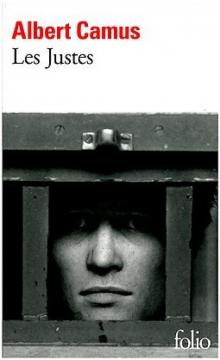 Les Justes
Les Justes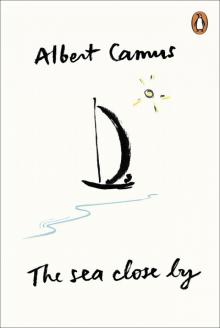 The Sea Close By
The Sea Close By The Stranger
The Stranger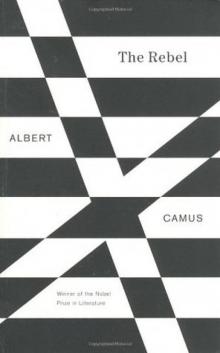 The Rebel: An Essay on Man in Revolt
The Rebel: An Essay on Man in Revolt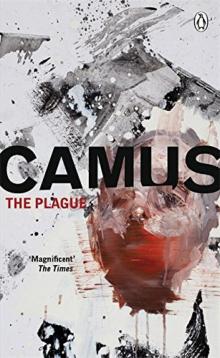 The plague
The plague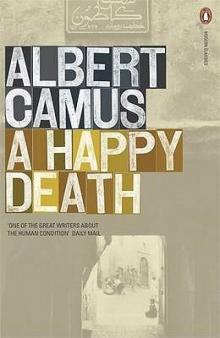 A Happy Death
A Happy Death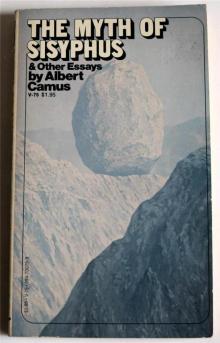 The Myth of Sisyphus and Other Essays
The Myth of Sisyphus and Other Essays The Fall
The Fall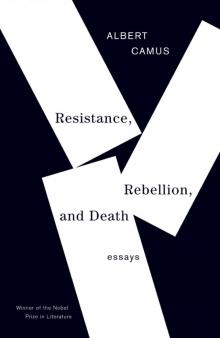 Resistance, Rebellion, and Death
Resistance, Rebellion, and Death The First Man
The First Man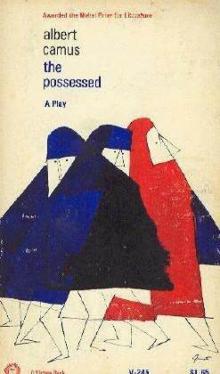 The Possessed
The Possessed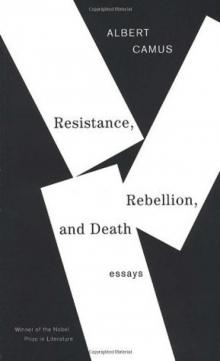 Resistance, Rebellion and Death: Essays
Resistance, Rebellion and Death: Essays